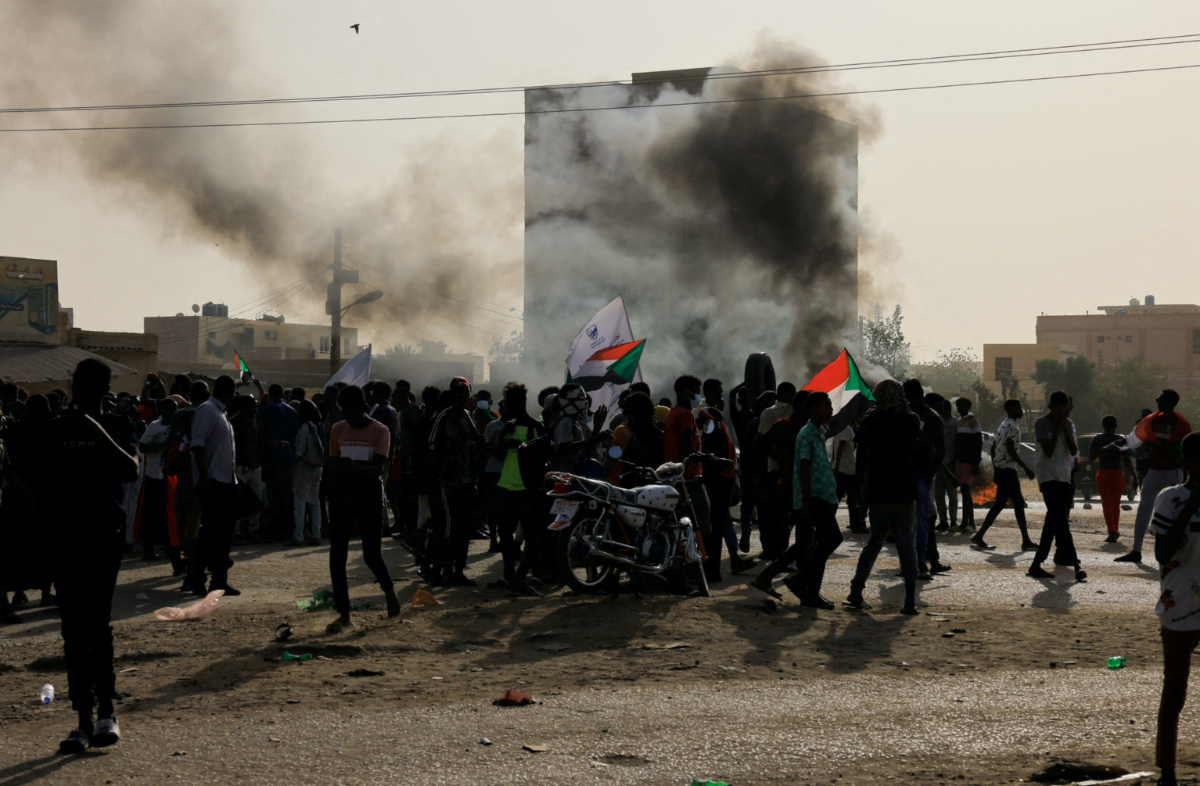
ELLIS HEASLEY, of UK-based religious freedom advocacy CSW, says the situation facing churches in Sudan is worsening following last October’s coup…
Two church leaders are arrested and interrogated just a week after extremists ordered that their building be closed down. Elsewhere, another church faces a partial demolition that would render it completely inaccessible to the public, while in another part of the country a 19-year-old church elder is killed and several religious buildings are completely destroyed in a widespread attack perpetrated by a nearby tribe.
These are just a few of the ever-growing list of violations which have taken place in Sudan in the aftermath of the military takeover of October, 2021; all were documented within the last month alone.

Protesters march during a rally against military rule following coup in Khartoum, Sudan, on 10th February. PICTURE: Reuters/Mohamed Nureldin Abdallah/File photo.
The October coup quite rightly prompted widespread international concern that Sudan might return to the horrors witnessed under the rule of Omar al-Bashir, with the past couple of years of fragile democratic transition completely undermined and reversed. Sadly, with every passing month these concerns prove wholly justified.
For example, there has been repeated government interference in the affairs of a host of Christian denominations, including the Sudan Presbyterian Evangelical Church. As well as facing the aforementioned partial demolition in Khartoum Bahri, property belonging to the SPEC has been taken over in several other states, while at least two SPEC leaders are currently facing criminal charges relating to their opposition to an illegally-constituted committee designed to interfere in the church’s affairs.
“The October coup quite rightly prompted widespread international concern that Sudan might return to the horrors witnessed under the rule of Omar al-Bashir, with the past couple of years of fragile democratic transition completely undermined and reversed. Sadly, with every passing month these concerns prove wholly justified.”
Also targeted is the Sudanese Church of Christ, a predominantly Nuban denomination which has experienced both religious and ethnic discrimination for several years. Most recently, in Gezira state, local Wahhabi extremists have reportedly posted an order for the closure of a building used by the SCOC but belonging to the Catholic Church, accusing the church and its leaders of disturbing the peace and disturbing people of other faiths in the area.
The building in question is also open to the local Muslim community and has been used for a range of social purposes, including as a nursery. However, days after the order was posted on the building, local police reportedly disrupted a church service on 27th February and arrested two church leaders. It is a concerning move that could validate the claims of extremists that legal action can be taken against those who do not comply with their orders.
Such interference and harassment bears worrying echoes of the al Bashir era, during which the government interfered with church administration often mandating illegally constituted governance committees that were pro-government to further restrict the rights of Christians. This interference, often undertaken by National Intelligence and Security Service officers, was presented as an intra-church conflict when in practice it was state-orchestrated.
Harassment of churches is just one indicator of the concerning rollback in the situation of human rights in Sudan. Earlier this month, at the 49th session of the United Nations Human Rights Council, the UN High Commissioner for Human Rights Michelle Bachelet raised deep concern at the “sharp reversal of human rights achievements” since the October coup. She highlighted a host of human rights violations which had been documented over the past four months, including the use of excessive force by security forces, attacks on hospitals, widespread arbitrary arrests and detentions, and violations of the rights of children.
Many UN Member States responded with similar concerns, including a group of 13 missions who signed a joint statement expressing concern at “sustained attempts to unduly limit freedom of expression and peaceful assembly”.
While such statements are welcome, it is essential that the international community maintains systematic and focused pressure on the Sudanese military, carrying out detailed investigations into attacks on protesters, and ensuring that the country remains on the HRC’s agenda until and beyond the full restoration of democracy.
Our prayers for Sudan also remain essential. We must ask God to protect all Sudanese citizens, especially those taking to the streets in protest, and to change the hearts of those in power so that they would allow Sudan to return to the process of democratic transition, and ultimately to democracy and peace.
Ellis Healey is public affairs officer at UK-based religious freedom advocacy CSW.





